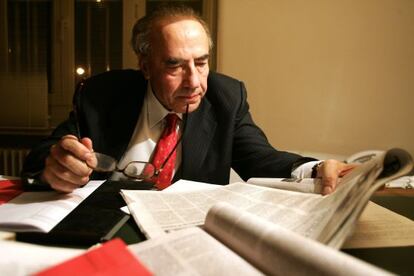Gregorio Peces-Barba dies at 74
One of the founding fathers of the Constitution, university professor and politician

Gregorio Peces-Barba, the former speaker of the house in Congress and one of the seven founding fathers of the Spanish Constitution, has died aged 74. He had been in hospital since the beginning of last week suffering from a kidney complaint and cardiac problems.
Peces-Barba, who was speaker between 1982 and 1986, was born in Madrid in 1938. His father was a lawyer who later served as a military legal advisor to the army of the Second Spanish Republic and who was sentenced to death by the Franco regime, although this was later commuted.
Peces-Barba studied at the Lycée Français in Madrid, where among his peers were the future economy minister, Miguel Boyer, and exiled Bulgarian King Simeon. He obtained a law degree from the Complutense University, where he also earned his Doctorate cum laude with a thesis about the social and political thoughts of the progressive Catholic Jacques Maritain. At Strasbourg University he obtained a degree in comparative law.
He began his career as a lawyer in 1962. During the dictatorship he defended people in the numerous cases that came before the now-defunct Public Order Tribunal, as well as in courts martial. In one of these, the so-called Burgos Process, Peces-Barba defended Víctor Aranda, who was accused of membership of ETA.
In 1963, with Joaquín Ruiz-Giménez, Pedro Altares and Javier Rupérez, Peces-Barba launched the magazine Cuadernos para el Diálogo (or, Notebooks for Dialogue), which brought together the efforts of professional sectors dedicated to the fight against the dictator. When Ruiz-Giménez founded the Democratic Left, Peces-Barba aligned himself with the Christian Democrat-inspired group.
Peces-Barba was instrumental in the foundation of Carlos III University and served as rector
His career as a university professor began in 1966 at the Complutense in Madrid, where he taught philosophy of law. In 1982, through competitive public examinations, he obtained the post of senior lecturer in philosophy of law and natural law. Later, he would head the department.
Under the Franco dictatorship, Peces-Barba embarked on a crusade in defense of human rights and democracy. In 1971 he was arrested and suspended from the bar for several months. The following year, he affiliated himself with the Socialist Party (PSOE).
When the Transition process began, Peces-Barba balanced his teaching duties with political activism. In 1976 he sat as vice president of the 272nd PSOE conference, the first in Spain after the death of Franco, following the exile of many of its members during the dictatorship.
In 1977, Peces-Barba became the PSOE deputy for Valladolid. Among his parliamentary duties was the chair of the party secretary-generalship in Congress. Two years later he was named party secretary, a post he served in until his resignation in 1981. The following year he was reelected as deputy for Valladolid and later the same year voted in as speaker of the house. At the end of the legislature in 1986, he departed politics and returned to his roots at the Complutense.
Peces-Barba was instrumental in the foundation of Carlos III University and served as rector from 1990 to 2007. In 1991, he and his six colleagues who created the Constitution were named doctors honoris causa of the distance-learning university UNED.
In 2004, the year of the Madrid train bombings, the government named Peces-Barba High Commissioner for the Attention of Victims of Terrorism, but he resigned the post in 2006 following criticism from the Association of Victims of Terrorism.
Among many honors bestowed on Peces-Barba were the Collar of the Order of Civil Merit, the Great Cross of the Order of San Raimundo de Peñafort, the Medal of Honor with the rank of Great Cross and the Légion d’Honneur.
Tu suscripción se está usando en otro dispositivo
¿Quieres añadir otro usuario a tu suscripción?
Si continúas leyendo en este dispositivo, no se podrá leer en el otro.
FlechaTu suscripción se está usando en otro dispositivo y solo puedes acceder a EL PAÍS desde un dispositivo a la vez.
Si quieres compartir tu cuenta, cambia tu suscripción a la modalidad Premium, así podrás añadir otro usuario. Cada uno accederá con su propia cuenta de email, lo que os permitirá personalizar vuestra experiencia en EL PAÍS.
¿Tienes una suscripción de empresa? Accede aquí para contratar más cuentas.
En el caso de no saber quién está usando tu cuenta, te recomendamos cambiar tu contraseña aquí.
Si decides continuar compartiendo tu cuenta, este mensaje se mostrará en tu dispositivo y en el de la otra persona que está usando tu cuenta de forma indefinida, afectando a tu experiencia de lectura. Puedes consultar aquí los términos y condiciones de la suscripción digital.








































